25 Evidence-Based Benefits of Watermelon
Health Benefits of Watermelon
Is watermelon healthy? If so, what are the health benefits of watermelon?
Why is watermelon good for you?
Read these 25 science-backed benefits of eating watermelon and enrich your diet with this juicy berry!
Contains Antioxidants
Oxidative stress in humans is an unavoidable phenomenon that usually occurs due to imbalances in antioxidants (5).
As much as we would like to ignore it, oxidative stress is inevitable; however, there are ways to reduce the effects that this process has on our body and our life, and watermelon is good for this.
Since this type of stress is associated with DNA, protein, and membrane damage, it is very important that you eat the right foods and keep your body healthy to avoid all the damage that this can cause (5).
One way is to make sure you are consuming enough antioxidants.
Studies have found that consuming specific fruits and fruit juices, such as watermelon and watermelon juice, can actually reduce the amount of oxidative damage because the antioxidants in those fruits have the power to scavenge the reactive oxidative species and render them harmless.
The radical scavenging is actually maintained for up to ninety minutes after the consumption of the fruit or juice, suggesting that the work of antioxidants continues long after you first consume them (5).
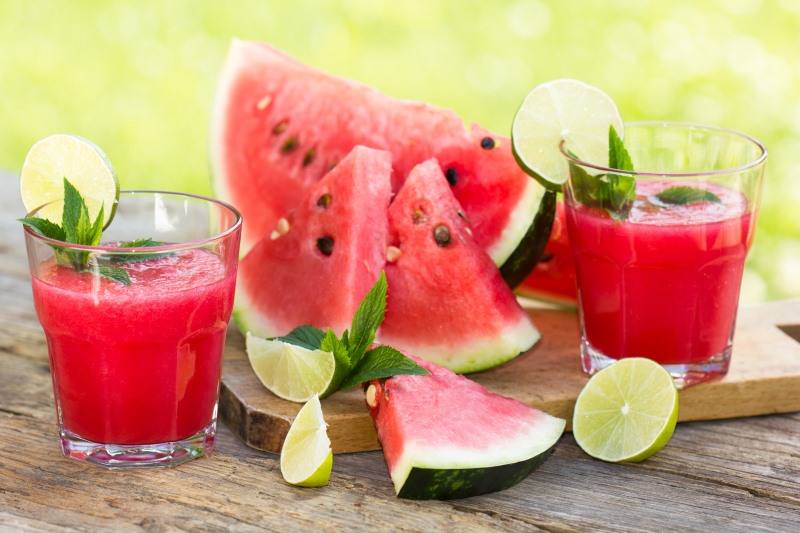
Lowers Blood Pressure
Hypertension, or high blood pressure, is the most common condition seen in primary care and commonly leads to heart attacks, strokes, and other fatal diseases if untreated (6).
What is watermelon good for in lowering blood pressure and what is the importance of watermelon for this?
Watermelon is rich in citrulline, which is an amino acid that is converted to arginine in the body (7).
In turn, both citrulline and arginine help in the production of nitric oxide, which is a vasodilator, meaning that it helps to relax and dilate your blood vessels.
When the vessels are dilated, more blood can pass freely through, leading to lower blood pressure and less of a risk for such things as stroke and cardiac infarctions (7).
Even better, the carotenoids present in watermelon help prevent the hardening of arteries and veins, thereby also helping reduce the risk of blood clots and atherosclerosis.
Clinical trials have shown that supplementation with watermelon and watermelon juices can actually reduce your aortic blood pressure and may even provide cardioprotection to keep your heart healthy and working smoothly (8).
Reduces Insulin Resistance
When people hear “insulin,” many automatically think of diabetes, since insulin is so critical in this disease.
Type 2 diabetes especially is a metabolic disorder that is characterized by hyperglycemia and developing insulin resistance.
In this type of disorder, your body produces insulin, but your body’s cells become resistant to the effects of insulin (9).
If your cells can no longer “feel” the effect of this critical hormone, the only way to treat and/or cure the disease is to make your body’s cells less resistant.
Fortunately, many studies have been making progress in evaluating the role of functional foods in chronic illnesses, such as diabetes, metabolic syndrome, and insulin resistance.
In one study, obese, diabetic patients were given oral supplements of L-arginine, the amino acid that watermelon compounds are easily converted to (10).
Compared with diet and exercise programs alone, the long-term oral L-arginine treatment had a significantly more beneficial effect on glucose metabolism and insulin sensitivity (10).
Such studies give hope that more research in the area of functional foods will shine a light on the potential health benefits watermelon owns.
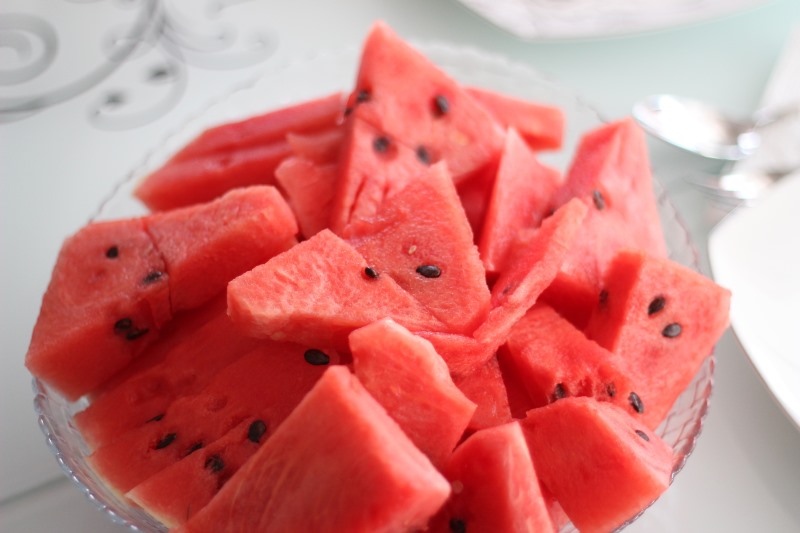
Watermelon and Muscle Soreness
Many people have no doubt felt really good after working out, where you feel as if you could run a marathon!
There is, however, an equally common feeling of muscle soreness several hours or so after that same workout that makes you want to flop on a couch and sleep for the rest of the day.
Fortunately, scientists have been making progress in assessing natural muscle relief for athletes and those who experience pain after working out.
One of the top candidates for such a natural remedy is L-citrulline (11), which is a newcomer to the world of nutrition since it is only really found in one food — watermelon.
Dietary supplements rich in L-citrulline have been shown to help with smooth muscle relaxation, enhance anaerobic performance, and relieve muscle soreness.
Several studies also suggest that this specific compound has the ability to accelerate lactic acid removal, which allows for better overall physical performance (11).
Therefore, not only this health benefit of watermelon and its high citrulline content are beneficial for post-workout recovery, but eating watermelon may also be good in pre-workout regimens since it allows for more intense training and faster recovery after each workout.
Watermelon and Kidney Disorders
Contrary to what the name may imply, there is more to watermelon than just water.
In fact, the benefits of watermelon include a very abundant supply of both calcium and potassium, each of which contributes to helping flush out the toxins in the body’s kidneys (12).
Even better, the calcium provided by watermelon is important for regulating cell functions, maintaining cell structure, and benefitting the cell differentiation process.
Extra calcium also aids in reducing the concentration of uric acid in the blood.
Too much uric acid can cause hyperuricemia, which will make you very sick (12).
By decreasing any extra amounts of this acid, the calcium and potassium in watermelon help to reduce the chances of kidney diseases.
Although these two compounds are very important, we can’t forget about water, the namesake of this beneficial fruit.
Watermelon’s high water content induces frequent urination, which, once again, is always helpful in cleansing the kidneys and keeping them functioning properly (12).
Just as drinking several glasses of water is beneficial, watermelon will provide you with an ample amount of hydration while also adding a sweet taste and delicious texture.
What more could you ask for!
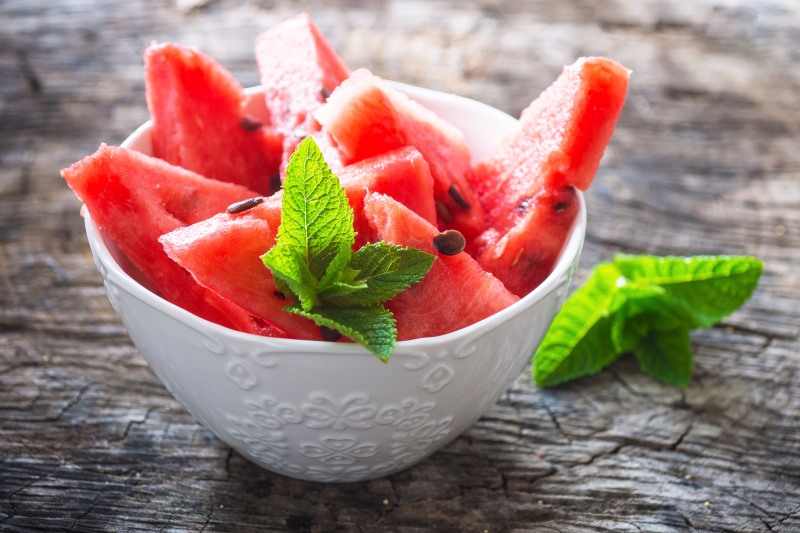
Watermelon and Cancer
Current research has found direct links between active food components and cancer prevention and treatment.
One of the compounds most thoroughly studied is lycopene, a dietary component that seems to interfere with the numerous stages in the development of cancer (13).
Lycopene functions in diminishing insulin growth, which is a vital step in decreasing the prevalence of cancer.
Other evidence has shown that lycopene helps with the regression of cancer by targeting and interrupting cancer cell growth, apoptosis, carcinogen metabolism, and hormone regulation.
Although lycopene is found in several other foods, such as tomatoes and pink guava, it has a unique role in watermelon since this particular fruit has readily available cis-isomeric lycopene, a highly sought after form of the compound (13).
And what are the benefits of watermelon for cancer?
With the incredible antioxidant potential of watermelon and the impact of lycopene as well, all factors make this amazing fruit an even better cancer-fighting food that is so easy to add to your daily diet.
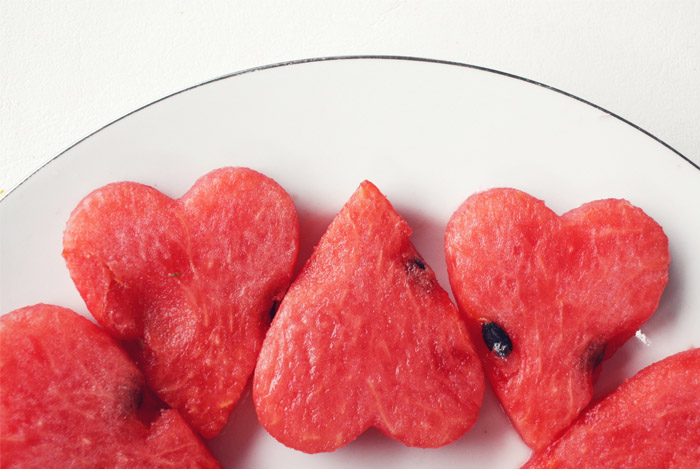
Watermelon and Heart Health
Cardiovascular disease causes a great many deaths.
One of the main risk factors for cardiovascular disease is cholesterol content, specifically, the low-density and high-density lipoprotein ratios.
In several studies, it was found that a 10 mg/dL increase in LDL cholesterol was associated with a 12% increase in risk for CVD, demonstrating the importance of maintaining low levels of LDL cholesterol and appropriately higher levels of HDL cholesterol.
Many researchers and scientists alike agree that LDL cholesterol levels are a strong independent predictor of coronary heart disease, especially for those patients with diabetes (14).
Consequently, the reduction of LDL ratios will further decrease one’s risk for associated heart diseases.
How healthy is watermelon for your heart?
Fortunately, the abundance of lycopene found in watermelon has been shown to be an effective compound in lowering such cholesterol levels (15).
In one study, scientists fed men 60 mg of lycopene per day for three months.
They discovered that the men’s plasma LDL levels decreased on average by 14%.
Calculations have found a 3:1 ratio between the lowering of cholesterol and reduction of risk of myocardial infarctions.
Therefore, people who consume this amount of lycopene from such products as watermelon should expect about a 30%–40% decrease in their risk for heart complications (15).
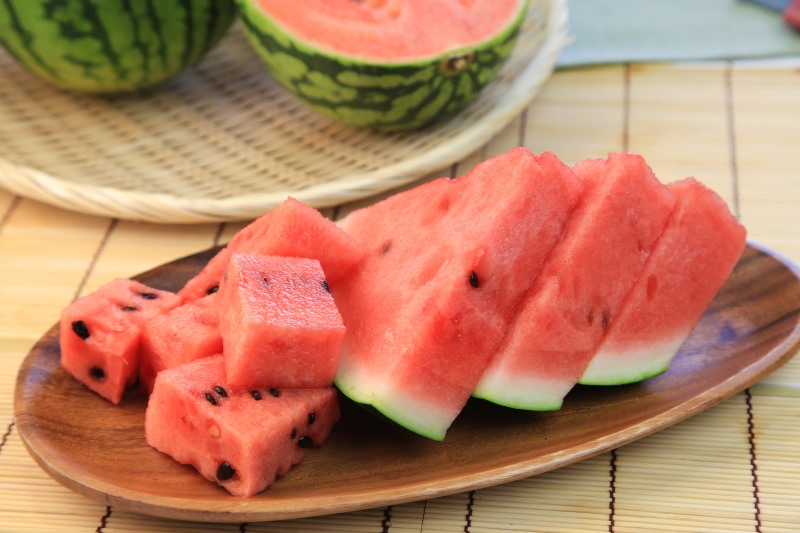
Watermelon and Macular Degeneration
Deteriorating eye health comes with age, but many simple and convenient measures can prevent premature eye degeneration and unfortunate eye diseases.
Many studies and research have focused on the role of carotenoids and vitamins in eye health.
As is commonly known, vitamin A is a primary vitamin that helps our eyes stay healthy (16).
A deficiency of such a vital vitamin can cause macular degeneration and xerophthalmia.
Evidence has shown, however, that provitamin A carotenoids in the diet can actually prevent such consequences from occurring by eliminating reactive oxidative species.
Additionally, an in vitro study on human lens epithelial cells showed that the addition of lycopene, the carotenoid found in watermelon, helped to significantly prevent the vacuolization of the epithelial cells, leading to better eye health and less risk for eye diseases, such as cataracts and glaucoma (16).
One of the watermelon benefits is that watermelons are rich in such carotenoids and antioxidants, they are the perfect remedy for preventing macular degeneration.
Watermelon and Erectile Dysfunction
A recent study estimated that nearly 1 in 52 men worldwide experience some degree of impotence.
Based on these same estimates, it was concluded that the prevalence of this condition could double over the next twenty-five years, suggesting the importance of finding a cure for impotence (17).
Fortunately, doctors and researchers have been studying the problem and seem to finally understand the underlying biology.
After much research and false claims over the past fifty years, doctors now know that it is the relaxation, not the stimulation of the smooth cavernous veins in the penis that cause an erection.
This parasympathetic and non-cholinergic mediated process requires nitric oxide, which is synthesized from L-arginine by NO-synthase (18).
Since L-arginine is the precursor to nitric oxide and arginine is readily found in watermelon, we would want both together.
Several studies have tested this theory about watermelon and its arginine content.
One study tested forty men with impotence and treated them with L-arginine, a placebo, or a dual-therapy of L-arginine and pycnogenol.
Researchers found that the L-arginine did indeed improve sexual functioning but was even more beneficial when paired with the other drug (18).
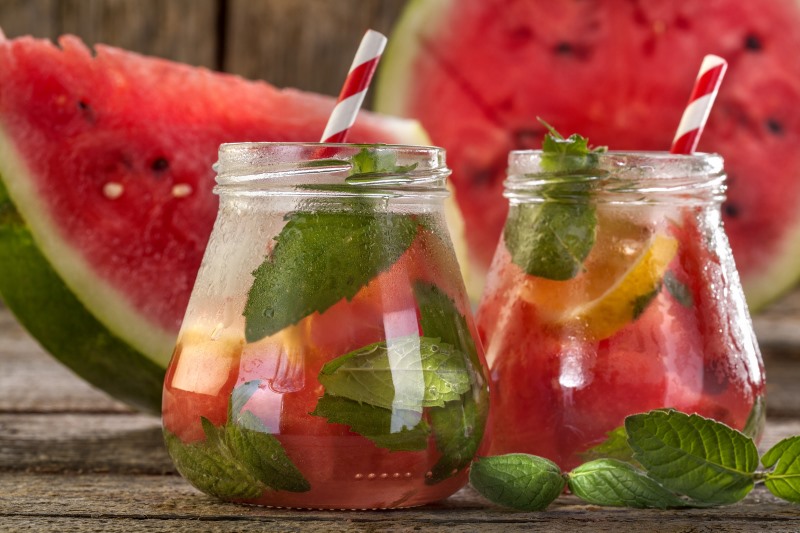
Watermelon and Asthma Prevention
Asthma affects nearly 9% of children and almost 7% of adults (19).
Of this figure, about 70%–90% of people with asthma also suffer from something known as exercise-induced asthma, where any type of physical exertion leads to asthma-like symptoms.
When we breathe normally, our nose clears, warms, and moistens the air around us.
On the other hand, during physical exercise, we end up breathing harder, faster, and deeper through our mouths, so the air that enters our lungs is colder and drier than usual.
In people with asthma, the bronchi are highly sensitive to such dry air and might swell up, as a result, leading to being unable to breathe fully — an asthma attack (19).
People without asthma, however, do not have bronchi in their lungs that are as sensitive and therefore do not overreact when coming in contact with cold, dry air.
Studies have found that there may be a link between the consumption of certain nutrients and a person’s risk for asthma.
One of the nutrients in question is ascorbic acid, or vitamin C (19).
Many tests have been conducted to determine if vitamin C helps protect the hyperactive airways of people with exercise-induced asthma (20).
Results are varied, so no conclusive evidence can be determined.
Although research has not found a statistically significant answer, numerous patients in such studies benefit from vitamin C treatment therapy, suggesting that although we have not found an answer yet, vitamin C might help treat or prevent asthma.
Watermelon and Digestion
One of the most common gastrointestinal problems is constipation, which is characterized by a slow gastrointestinal transit, a hard stool, and difficulty in the passing stool (21).
A number of factors can cause constipation, including medication, lack of fiber intake, poor diet, and illness, but the number one cause is usually inadequate fluid consumption.
Drinking plenty of water every day can eliminate this unfortunate and uncomfortable problem.
Fluids in the diet are usually absorbed by the proximal small intestine, but when not enough fluids can be absorbed, such problems as constipation and other gastrointestinal issues can occur.
Because watermelon has both a rich water and fiber content, this juicy fruit easily helps promote regularity for a healthy digestive tract (21).
Although we emphasize that there is more to watermelon than just water, the water content of this fruit is nonetheless important.
Instead of simply drinking the recommended nine to thirteen glasses of water per day, you can treat yourself to a healthy snack of sliced watermelon while also promoting your digestive health.
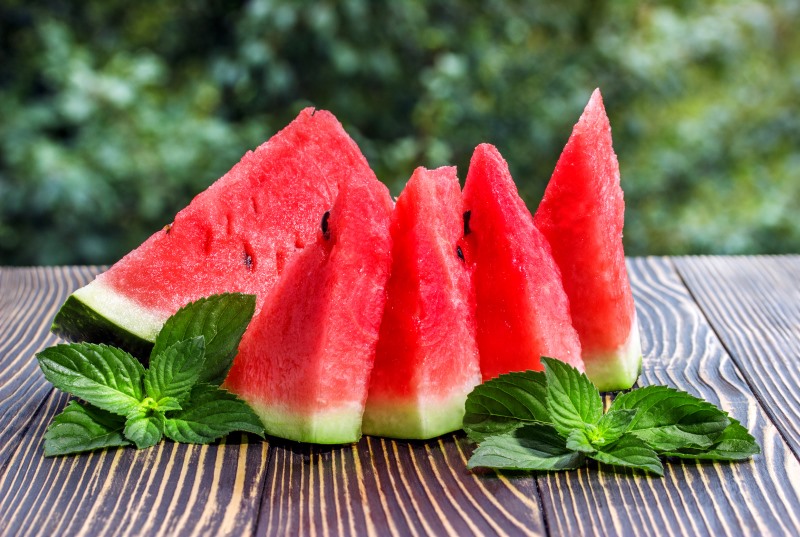
Helps Treat Duchenne Muscular Dystrophy
Unfortunately, doctors have come to realize that both chronic and low-grade inflammations are common causes and/or symptoms for many diseases, such as obesity, diabetes, and even such muscular disorders as Duchenne muscular dystrophy (DMD) (22).
In such a disorder, there is severe muscular degeneration that leads to chronic inflammation, among other things.
To help treat this disorder, researchers have taken to using the compound L-arginine to inhibit the inflammatory signaling cascade.
In their studies involving Duchenne muscular dystrophy tests and L-arginine, researchers found that L-arginine did indeed decrease inflammation and increase muscle regeneration in animal models (22).
One of the key cytokines in DMD is called nuclear factor (NF) – κB levels, whose signaling seems to be interrupted in this particular muscular disorder.
When L-arginine was used to treat subjects with induced DMD, the treatment also inhibited the (NF) –κB cascade, thereby promoting muscular membrane integrity and posing as a therapeutic option for DMD management (22).
As watermelon has an abundant arginine, this fruit could be utilized for its benefit in helping muscular disorders, such as DMD.
Watermelon and Skincare
We all turn to vitamin C when we feel that a sore throat coming on or when we notice a slight cold developing, but vitamin C actually helps with much more than just preventing sickness.
Vitamins C and E are the most important natural antioxidants for anti-aging benefits because their small molecular weights allow them to penetrate the skin and induce the production of collagen, which is vital for keeping your skin smooth and healthy (23).
This promotion of collagen production also helps protect the skin from sun damage — chronic photodamage from too much exposure to UV rays of the sun manifests itself as extrinsic skin aging and wrinkles.
The research aimed at preventing photoaging includes sun avoidance, sun protection, and therapy that promotes collagen production.
Fortunately, vitamin C does just that!
Because vitamin C is not synthesized by the body, it is important to add an adequate amount of this vitamin into your daily diet.
Citrus fruits, guava, chili peppers, and watermelon are all hearty sources of vitamin C (23).
As they say, beauty truly does start from within, which means that protecting your skin begins with what you put into your body.
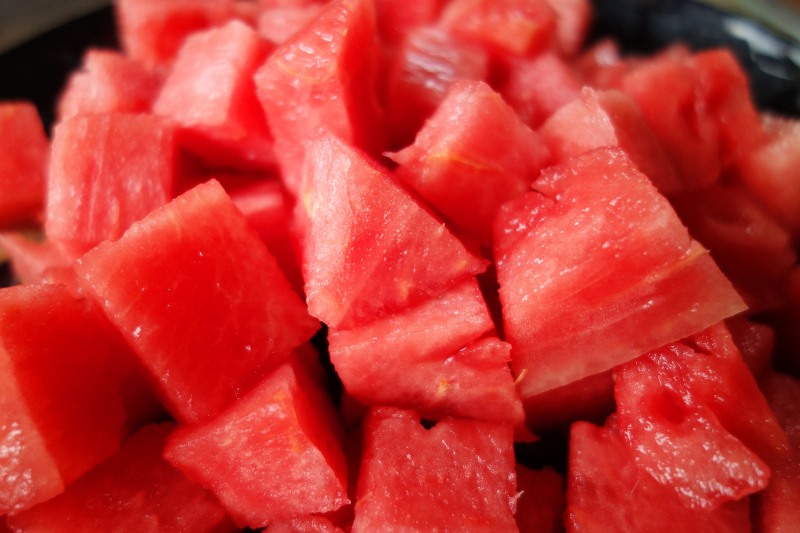
Watermelon and Hair Growth
Male pattern baldness is a landmark in time that no man wants to pass.
On the other hand, just as unwanted is the thinning of hair in women as they age.
The effect of hair loss is not just a superficial physical effect, but it has also been documented that it takes an emotional toll on the patient as well (24).
The mammalian hair follicle contains papilla and dermal sheath cells and undergoes a cycle of growth as the follicle ages.
Certain growth factors are believed to cause the epithelial cells in the hair follicle tissues to proliferate and differentiate, leading to thicker and more abundant hair (25).
Since a derivative of vitamin C, l-Ascorbic acid 2-phosphate, is known to stimulate human fibroblasts and osteoblasts, researchers have suggested that such a supplement may be useful for hair growth.
Indeed, when hair follicles were isolated and treated with this compound, scientists saw significant growth stimulation in dermal papilla cells as well as an elongation of the hair shaft (25).
Such findings may suggest that vitamin C promotes the growth of hair follicles, which is one more reason why vitamin C-rich watermelon should be an essential part of everyone’s diet.
Watermelon and Weight Loss
Because watermelon is composed of so much water, it is by no means unusual to hear that eating watermelon may help to reduce fat or lose weight.
This property of the fruit, however, may be attributed to more than just its high water content.
The high levels of citrulline in watermelon mean that when our body processes this amino acid it can convert it into another amino acid called arginine.
Recently, several studies have been finding evidence that the more conversion there is from citrulline to arginine, the more the amino acids block the activity of an enzyme called tissue-nonspecific alkaline phosphatase, TNAP.
Interestingly, blocking the metabolic activities of this enzyme may help to prevent excess accumulation of fat in fat cells.
The reason this occurs is thought to begin with arginine’s function in the body.
Researchers have found that arginine stimulates lipolysis and the expression of several genes responsible for fatty acid oxidation (27).
The more fatty acids that are oxidized into carbon dioxide and water, the more your body also reduces your amount of stored body fat.
Although more research must be done in this area to specifically prove arginine’s role in helping reduce body fat, it certainly cannot hurt to make sure you have enough arginine and watermelon in your daily diet!

Watermelon and Bones Health
Many people always think of “milk” or “calcium” when we hear about improving our bone health.
Along with improving our cardiovascular health, lycopene has also been found to improve our bone health and prevent unnecessary bone loss as we age (28).
Lycopene is exactly what it is categorized as—an anti-oxidant.
It reduces oxidative stress caused by free radicals, which in turn reduces the activity of osteoblasts and osteoclasts (28).
These nasty bone cell categories are the ones that are usually involved in the onset and pathogenesis of osteoporosis.
Additionally, one study discovered that another way lycopene exerts its protective effect on our body and our bones is by suppressing bone resorption, which significantly inhibits bone loss (28).
Luckily, watermelons are packed with both lycopene and a bit of calcium as well, which makes for a superfood that your bones will love!
Muscles and Nerves Support
When you think of foods that are rich in potassium, watermelons may not be the first fruit that comes to mind, but they do actually contain a great amount of potassium, which is highly beneficial for your muscles and nerves (29).
One of the major functions of potassium is to regulate the excitability of nerves and muscle tissue.
Both magnesium and potassium are intracellular cations, and the plasma concentrations of each on either side of intracellular and extracellular membranes greatly contributes to the resting membrane potential, which is much like the homeostatic amount of cations on both sides of the membrane (29).
Thus, potassium helps to determine the degree and frequency with which our muscles relax and contract.
Watermelon is also a natural electrolyte, meaning that it is an important nutrient for our body that needs to be replenished since it sends key impulses that influence our heart, muscles, and nerves (29).
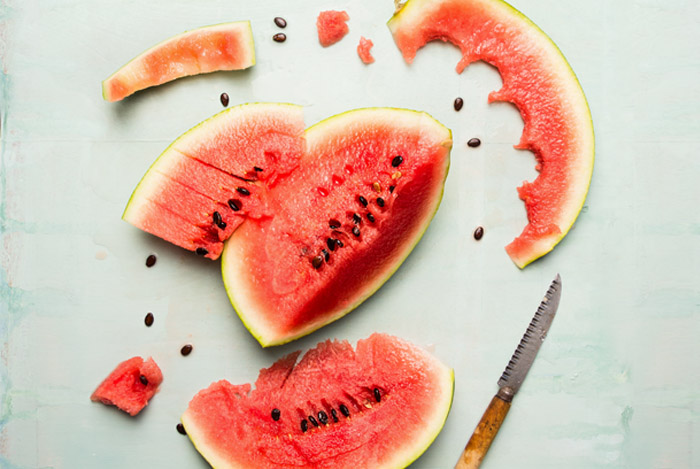
Watermelon and Inflammation
We have already discussed how watermelon and the nutrients it provides may be a therapeutic option for Duchenne muscular dystrophy, which is a disorder that prompts inflammatory markers.
Although they may seem similar, chronic and low-grade or short-term inflammation can actually be quite different, which means that treating them allows for differences as well.
In several studies, watermelon powder was studied and tested to see if such a concoction was effective in reducing inflammation in dextran sodium sulfate-treated rats (30).
Although supplementation of L-arginine and L-citrulline had already been found to be viable in decreasing inflammation, this study aimed to discover if watermelon powder may have the same effect.
Indeed, the DSS treatment used on the rats induced inflammation, but the watermelon powder supplement efficiently improved the inflammation over a certain period of time.
Because inflammation is a strong contributor to many different diseases and disorders, such as atherosclerosis and subsequent cardiovascular disease, finding plausible methods to treat inflammation is important (30).
Watermelon and Alkaline
Many fad diets lose their credibility and efficacy because they promise fantastic weight loss in a minimal amount of time.
Many such diets are not actually good for your body and are simply aimed to make you lose weight but not necessarily in a healthy way or to keep the weight off.
You may think that an “alkaline diet” is another scam to lose weight, but an alkaline-based diet has nothing to do with weight loss.
Much research has been done about adding alkaline foods to your diet.
You may reduce your risk of mortality and morbidity from chronic illnesses and diseases by doing so (31).
For humans, we require a very narrowly controlled pH range of about 7.4 to survive.
Reducing your acid load and focusing on alkaline-forming foods has been found to prevent loss of muscle mass as we naturally age, and it has also been suggested that supplementation of alkaline minerals may improve chronic back pain (31).
Studies have also noticed that since chemotherapy is influenced heavily by pH, inducing metabolic alkalosis in chemotherapy patients is useful in enhancing some treatments.
So, even though you may not be undergoing chemo or have back pain, foods rich in alkaline, such as watermelon, have been proven to reduce many of the natural symptoms that come with aging, allowing us to lead longer, healthier lives (31).
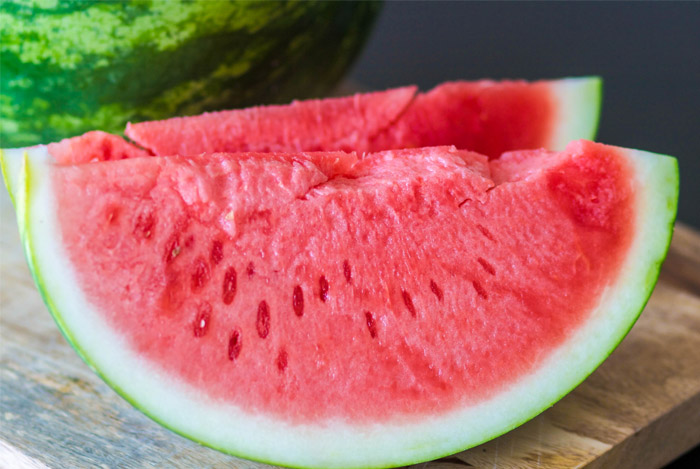
Watermelon and Wound Healing
Vitamin C, or ascorbic acid, is involved in all phases of human wound healing (32).
The recommended daily amount of vitamin C is around 60 mg, but many researchers are beginning to find that supplements of this nutrient that are far above the recommended daily amount may actually have a beneficial role in speeding up wound healing (33).
When tests were conducted by giving patients anywhere from 500 to 3,00 mg of vitamin C to subjects recovering from surgery, with an illness, other injuries, and ulcers, doctors found that the wound healing in subjects who were vitamin C deficient could be significantly accelerated with ascorbic acid supplements.
The reasoning behind this lies in the process of wound healing.
During the initial inflammatory phase, neutrophils are clustered in the injured area, and then they are required to self-destruct and clear from the area as the wound heals (32).
To do so, vitamin C is required so that the neutrophils can perform apoptosis.
During the proliferative phase, vitamin C is needed to help with the synthesis, maturation, and degradation of collagen as well as scar formation.
Finally, completely after the wounding, plasma levels of ascorbic acid decrease dramatically, so we must replenish the supply of this nutrient to continue and even speed up the healing process (32).
Because watermelon is so rich in vitamin C, it is a perfect candidate if you want more vitamin C.
Watermelon and Cell Damage
Free radicals are chemical species that are highly reactive because they are composed of a single electron (34).
They are very unstable and especially dangerous to biological systems, such as humans, due to the oxidative stress that they can cause on our bodies.
Unfortunately, oxidative damage by free radicals is only a normal occurrence.
Our natural endogenous system essentially protects us from the damage that these free radicals can do but only to a certain extent (34).
We need antioxidants and cofactors, nutrients that our body cannot synthesize, to further neutralize these harmful demons.
It is believed that oxidative damage has a key implication in overall aging as well as various diseases and age-related disorders.
Fortunately, common vitamins and nutrients, such as vitamin C, provide exceptional protection from the harm that free radicals cause (35).
Consuming the recommended daily amount of vitamin C, whether through supplements or such fruits as oranges and watermelon, will help keep the oxidative damage to a minimum and leave your body feeling as healthy as ever.
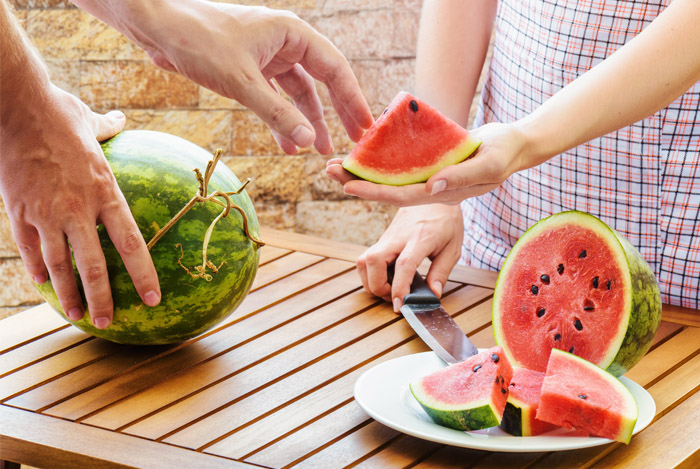
Watermelon and Heat Stroke
Watermelon is almost 92% water, with the rest being minerals, nutrients, and other compounds (36).
Being almost entirely made of water, though, is not the only reason why watermelon is so great at preventing heat stroke and other heat-related illnesses.
This fruit is also highly effective in reducing both your blood pressure and body temperature.
Epidemiologic studies have found that nearly 240 deaths occur each year in the United States due to heatstroke (36).
The best way to prevent heat stroke is to protect yourself by maintaining proper hydration and monitoring your exertion level.
The high amount of water and other hydrating liquids in watermelon help hydrate your body and also stimulate the release of excess liquid in the form of sweat, which is our body’s way of cooling us down.
Many outdoor laborers are prone to heatstroke, which is why in some countries, such as India and other tropical regions, laborers consume this fruit each day while they are working in the scorching sun (36).
Watermelon and Immune Support
Many of our mothers probably instilled in us the urge to drink a glass of orange juice when we start to feel a cold coming on, and they were right.
Many citrus fruits, such as oranges, contain an abundance of vitamin C, which helps fight off those common colds (37).
One of the less well-known watermelon health benefits is that watermelons also contain a hearty amount of vitamin C.
When we get an infection, illness, or are under a lot of stress, the vitamin C concentrations in our plasma and leukocytes rapidly decline.
Therefore, our bodies are lacking in a vitamin that we greatly need when we are sick, so supplementing vitamin C when you are sick or beginning to get an illness has had much success in improving the human immune system (37).
It helps your immune system by improving antimicrobial and natural killer cell activities as well as lymphocyte proliferation, which is the type of blood cells that are called for during infections and illnesses.
Research has also proven that adequate daily intake of vitamin C ameliorates symptoms and shortens the duration of infections, such as the common cold (37).
Watermelon is an additional fruit that provides rich helpings of vitamin C to help strengthen our immune system.
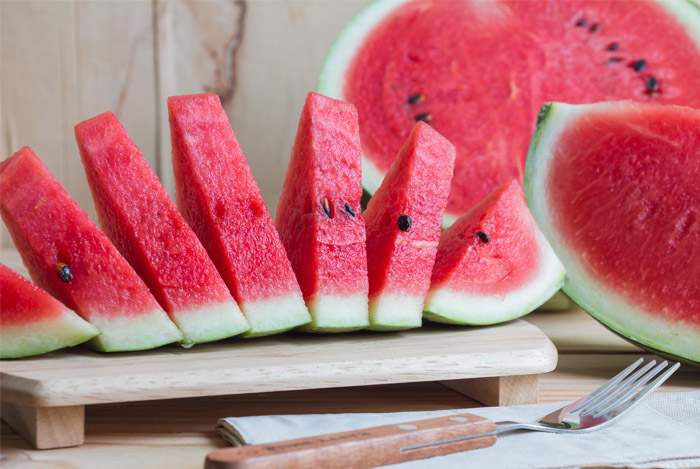
Watermelon and Gums Health
With all the health benefits named so far, it seems as if there isn’t much that watermelon can’t help!
Much of this is due to watermelon’s high amount of vitamin C, which helps ward off and prevent many diseases and health issues, one being gum disease (38).
Periodontitis is a slowly progressing infectious disease in tooth-supporting tissue.
Periodontal inflammation can even result in gingival bleeding, pocket formation in the gums, and eventually loss of teeth.
Severe forms of this disease are unfortunately relatively common, occurring in nearly 20% of the world population (38).
Low vitamin C concentrations in plasma have been studied as a risk factor for periodontitis as well as a possible treatment method.
A deficiency in vitamin C, however, does not cause periodontitis but having low concentrations of this vitamin make you more at risk for the disease.
Vitamin C is known to help with collagen synthesis and is clearly required in times of infectious diseases (38).
In such gum diseases as periodontitis, the tooth tissue is attacked by bacteria, so vitamin C is needed by the body to help repair the damage and regenerate new tissue.
Because watermelon is so high in vitamin C, this summer fruit can help you keep your teeth looking clean and fresh.
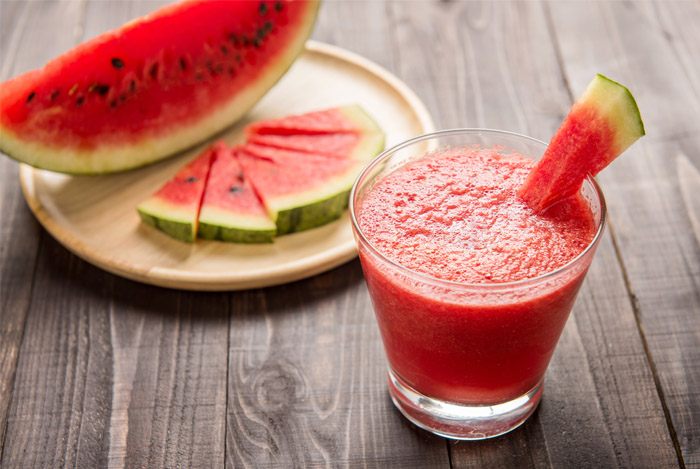
Watermelon and Scurvy
Scurvy first affected mariners during the fifteenth and sixteenth centuries (39).
Since we require ascorbic acid to survive and fight off infections, it is necessary to have the recommended daily amount to stay healthy.
This particular vitamin, however, cannot be synthesized in the body, so we must obtain it from supplementation or the foods we eat (39).
The main role of ascorbic acid is to absorb iron from the intestinal tract.
When we do not have enough of the vitamin, our body cannot keep up with the amount of iron that needs to be absorbed, leaving the patient lethargic, fatigued, and possibly anemic.
The longer a person lasts without the proper amounts of vitamin C, the more severe the symptoms become, leading to edema, jaundice, neuropathy, and even death.
This disease is almost entirely preventable, though, and simply monitoring your own intake of vitamin C and not going days and weeks without this essential vitamin can help prevent it (39).
Luckily, vitamin C is another benefit of watermelon!
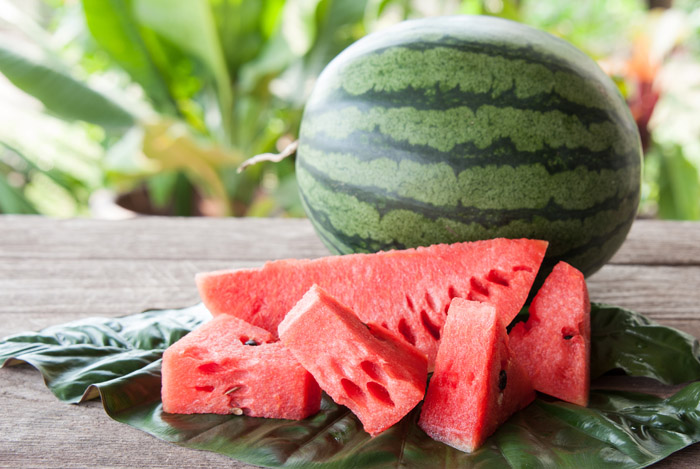
History
Although we think of watermelon today as that large, picture-perfect, dripping-with-sweet-juice fruit that makes our summer taste buds erupt, it was not always that way.
Watermelon’s wild ancestor was actually a bitter fruit with hard, green flesh and circular shaped.
Much of the history of watermelon is debated because of a lack of accurate information, but many historians agree that watermelon was initially cultivated in Africa before spreading north into the Mediterranean area and Europe (1).
Where it originated in Africa, however, remains a mystery.
Some theories claim that watermelon’s ancestor began in southern Africa, but evidence has suggested that Egyptians began growing watermelon 4,000 years ago, which predates farming in southern Africa.
The most likely candidate for the ancestral watermelon and the beginning of this popular fruit is the indigenous northeastern African watermelon because it was a convenient and easy food staple at the time (1).
The question that has truly puzzled historians, though, is why would the Egyptians continue cultivating watermelons in the first place since watermelons were hard and either bitter or bland.
The answer likely lies in the fruit’s name – water.
They contain a lot of water and could remain edible for weeks and even months as long as they were kept in cool, shady areas.
During dry seasons, their water would have been extracted (1).
How Watermelon Grows
Being native to Africa, watermelons need a warm and long growing season in temperatures up to 80 degrees each day.
Through trial and error, many harvesters realize that it’s best to grow watermelons in soil with a pH between 6 and 6.8, meaning that the ground should be slightly acidic.
Along with warmth and acidic soil, watermelons also require lots of water — about 2–4 inches per week to properly thrive (2).
Long, thin vines are characteristic of watermelon plants, which grow every which way.
To improve vine productivity, cutting off lateral side vines and leaving the main vines can help with this problem.
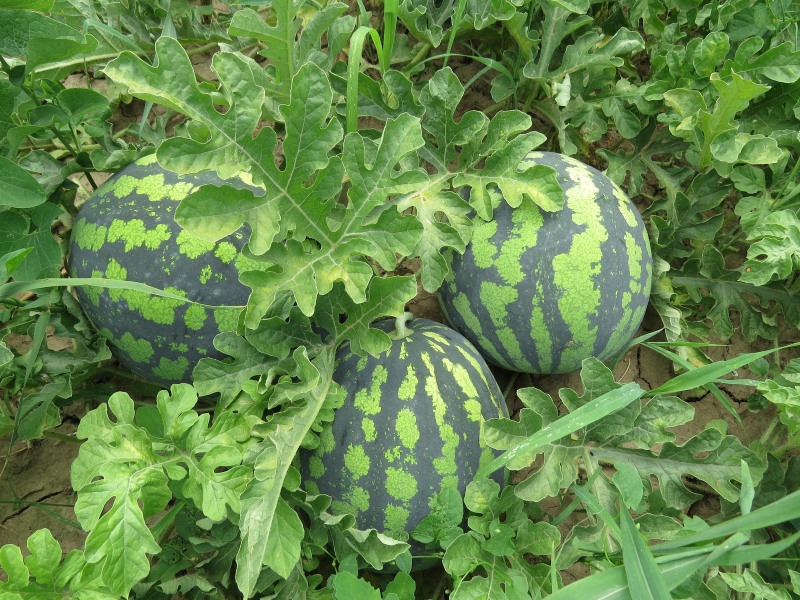
Varieties
The seedless watermelon was created in the 1990s.
It is one of the most common types of watermelon, and you have probably seen it at the local supermarket.
The trick in creating this type of watermelon was maintaining the same sweetness as seeded varieties but making sure the seeds were underdeveloped and therefore easily edible (3).
On the other hand, picnic watermelons are a bit larger than the seedless variety.
Picnic watermelons are arguably the most common type of watermelon available today, as they exhibit the traditional oblong shape, green rind, and sweet red flesh.
A less commonly known watermelon includes the yellow/orange variety, named appropriately so for its round shape and yellow to orange color (3).
This type of watermelon comes as both seeded and seedless, including Desert King, Yellow Doll, Yellow Baby, and Tendergold.
Interesting Facts
Archeologists have found watermelon seeds and remnants of other fruits at 5,000-year-old settlements in Libya.
Seeds are one thing, but finding pieces of the actual fruit is another, which is much more unlikely.
Fortunately, historians have found paintings of watermelons in Egyptian tombs that date back almost 4,000 years ago.
In fact, one of those tombs was actually the infamous King Tut’s tomb, which had a painting depicting a red, oblong watermelon rather than the ancient round fruit common at the time (1).
One reason why ancient civilizations kept paintings, as well as real watermelons in their tombs, was because of the water source that the fruit provided.
When Egyptian pharaohs died, it was believed they had a long journey ahead of them and therefore needed energy and water that the watermelon could provide in the afterlife.
Watermelon did not always have its famous red hue on the inside; instead, ripe watermelon used to have an almost yellowish interior, sometimes even orange!
As time passed and farmers began cultivating the fruit for specific purposes, watermelon began to take on its familiar red color (1).
Such a change occurred because the gene for the red color is actually paired with the gene that determines the sugar content and therefore the sweetness of the fruit.
As people bred watermelons to become sweeter instead of bitter, they caused the color of the fruit to change as well.
Nutrition Facts
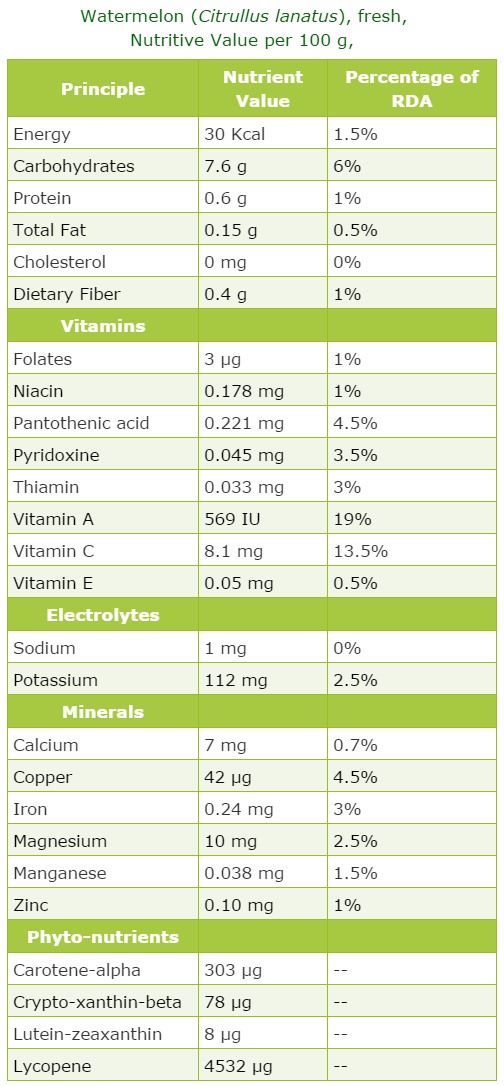
(Source: USDA National Nutrient database)
Although tomatoes have historically been the leading fruit famous for its high lycopene content, recent research is beginning to find that watermelon may actually contain more lycopene than tomatoes.
Lycopene is a carotenoid phytonutrient that is particularly important for our cardiovascular and bone health.
In fact, among the whole, fresh fruits, watermelons account for more intake of lycopene in the United States than any other fruit.
The largest increase in lycopene content occurs when the watermelon changes from a white-pink color to deep pink/red.
Therefore, it is highly important for getting the health benefits of watermelon to allow your watermelons to ripen properly to reap the most nutritional benefits from the fruit.
Aside from lycopene, more recent studies have been interested in the citrulline content in watermelons.
Citrulline is an amino acid that is most notable for being converted into arginine by the kidneys and other body systems.
This conversion to arginine is thought to greatly improve blood flow and other aspects of our cardiovascular health.
The flesh of a watermelon contains about 250 milligrams of citrulline per cup, these nutritional benefits of watermelon are just great and are put into such delicious food!
What’s more is that health scientists have actually found evidence that the more citrulline that is converted to arginine, the more your body can prevent excess accumulation of fat cells, which is always a good thing!
So, are watermelons good for you? Yes, they are!
How to Buy and Store
As many different types of watermelon are available, you can also buy it in different ways.
Many supermarkets offer precut watermelon that has already been sliced in half or cut into quarters.
Be sure to choose fruit with the deepest color of flesh and without any white streaking.
If the seeds are visible, make sure they are also deep in color or white.
On the other hand, when purchasing a full watermelon, you can’t really tell what color the flesh or seeds are, so one way to determine if it is ripe and juicy is if it feels heavy for its size.
Heavy watermelon means more water, which means the fruit is riper.
Additionally, knocking on the watermelon can also tell you whether or not the watermelon is satisfactory.
A fully ripened watermelon should have a deep, hollow sound when you knock on it rather than a solid, shallow sound.
Uncut watermelon should be stored in temperatures near 50°F–60°F, which is normally much colder than normal room temperature in your house.
Keeping the watermelon cold reduces the risk of decay, especially if you are planning to wait several days before slicing it open.
As for sliced watermelon, keep it covered at all times.
It should also be kept in cool temperatures, such as your refrigerator.
Storing cubes of watermelon in a Tupperware container and letting them cool in the refrigerator for about a day allows the fruit to ripen and sweeten.
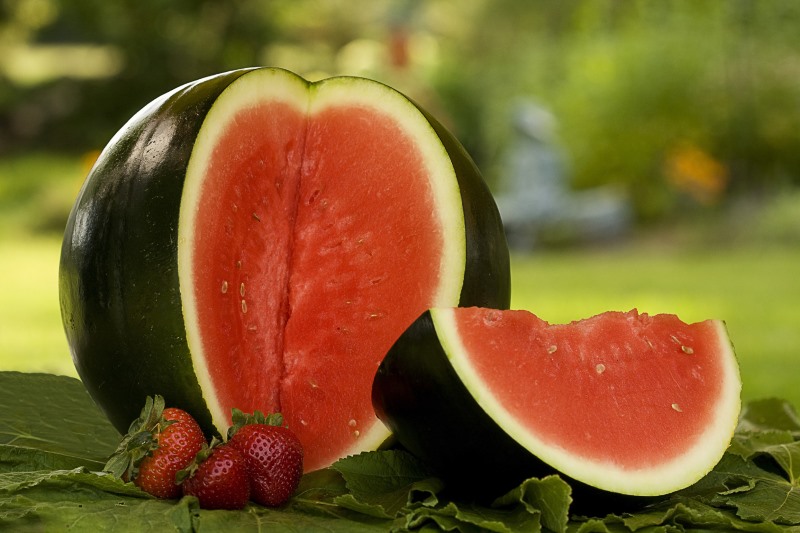
How to Add More Watermelon to Your Diet
Although watermelon is somewhat of seasonal fruit, there are lots of uses of watermelon, you can prepare many different meals and snacks with this fruit when it is in a season.
Here are some interesting ways of eating watermelon:
Precautions
Watermelon will not cause any significant side effects or symptoms as long as it is taken in moderation.
This caution applies to almost every food.
As long as you eat at an adequate pace and consume food in moderation, you will be fine.
Nonetheless, if a watermelon is eaten in excess, it could cause a disorder known as hyperkalemia, especially in those people who suffer from kidney disease.
Hyperkalemia is a medical term that refers to potassium levels in your blood that are higher than normal.
Watermelons do have a lot of potassium, and since sodium and potassium help maintain the equilibrium in our cells’ membranes, it is important that we maintain that dynamic equilibrium by controlling how much potassium and sodium we consume.
Although not common, some people may find that they experience allergic reactions after eating watermelon.
It has been noticed that many people who do experience allergic reactions are also those who are susceptible to celery, cucumber, or latex allergies since these foods share similar makeup, and latex is present in small amounts in all these foods.
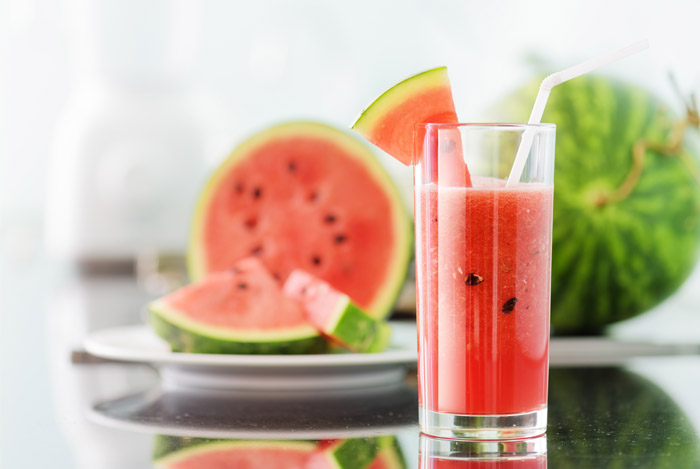
Conclusion
Watermelons have always been around — whether it was your mom feeding you cubes as a baby to munching on a pizza-shaped slice as you ran around like a toddler to sliding watermelons squares off a skewer at a backyard party.
Their health benefits, however, have not always been known.
Fortunately, we now know the answers to the questions: are watermelons healthy? And what are the benefits of eating watermelon?
Whether we’re talking about lowering your blood pressure, increasing your antioxidant intake, reducing inflammation, or healing wounds faster, there’s a watermelon benefit for each condition.
Watermelon may not be as versatile or as common as some other fruits, but it contributes to some unique and exciting new ways to look at food preparation.
The best thing about watermelon is that even though it targets many specific areas of our health, such as our cardiovascular or macular health, its overall contribution helps to keep us feeling young, healthy, and alive.
What more could you ask for in a fruit!
FDA Compliance
The information on this website has not been evaluated by the Food & Drug Administration or any other medical body. We do not aim to diagnose, treat, cure or prevent any illness or disease. Information is shared for educational purposes only. You must consult your doctor before acting on any content on this website, especially if you are pregnant, nursing, taking medication, or have a medical condition.
HOW WOULD YOU RATE THIS ARTICLE?
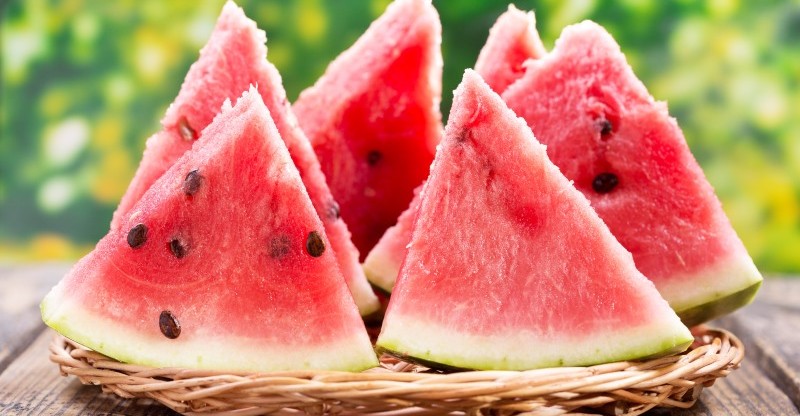




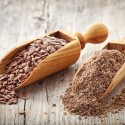

Interesting article. Thanks for sharing!
Glad you liked it Gary!
thank you very much for posting this article about watermelon and the health benefits we could from this fruit..
its a lot of help i could share this to my clientele in giving health education and how stay fit and right..
more power…
God bless..
Thanks Jocelyn,
I am happy you liked this article.
Thanks a lot for the article!!! How do you think can I eat watermelon during my pregnancy?
You’re welcome! Watermelons are incredibly beneficial but like any other product you should consume them moderately. If you have any questions, especially about eating them during pregnancy, it’s always better to ask your doctor.
I usually drink watermelon water to refresh myself in summer. Does it contain all the nutrients and vitamins as the watermelon itself?
I love watermelons, their benefit are incredible but they are such a seasonal fruit. In winter, they cost too much to eat them regularly. Will watermelon keep its benefits if I try to freeze it?
Are seedless watermelons as much healthy and beneficial as the regular ones? I don’t really enjoy the seeds but would like to incorporate more this impressive fruit into my diet.
Splendid tips. You’re marvelous. As per your information water melon is well indicated for health as it not only contributes ineffably to the prevention of some lethal diseases and to the upkeep of improved health, but also water melon producers and other actors in its value development chain reap huge revenues from its production.
Thanks a lot.
Wow. Great article..
What a wonderful article on watermelons. Thank you for sharing this post with us.
great benefits
I’m like the woman who spent all she had and grew none the better until she touched the one thing that made her WHOLE! Today, a friend of mine bought a watermelon for me, and I literally feel the difference in my body. Thank you for sharing so freely, which I’ll do also .
Loved this article! How much is too much? I am very passionate about this fruit.
If you really put the lycopene in foods into proper context, you’d know that it is a red carotenoid that is critical to eye health, especially the macula and when we don’t eat enough, AMD is the result. Tomato powder, Sun-fried tomatoes and tomato paste leads the world in lycopene and while watermelon is one of the few fruits that contain it, it is way down the list for lycopene content below these food items. Watermelon is #52 in this list sorted by lycopene content and red tomatoes are # 72 in this list. The foods in between are all tomato-based with the exception of wild rosehips, again, lycopene is a red carotenoid rather than the usual orange with which we are familiar and anticipate.
Wow – this must be the most detailed post about the benefits of watermelon I have seen on the Internet. I have recently taken to eating watermelon every morning after water and lemon juice, and it feels great. Filling this feeling with facts is what your article did for me, I thank you for that!
I’m an eye care professional and I noticed you wrote that watermelon can help prevent cataracts and glaucoma. Nothing in the diet can change glaucoma since it’s either the production of too much aqueous humor by the ciliary processes or the inability of the eye to drain the fluid quick enough, which leads to elevated eye pressure and optic nerve damage. Cataracts are a natural phenomenon that happen to all human beings that live long enough. The cells of the lens of the eye don’t slough off like other parts of the body but compact together as we age causing the lens to grow denser and inflexible. Cataract is just the fancy name we use for this. Some people just develop them faster due to genes, sun exposure, or trauma to the eye. I have no doubt though that watermelons in addition to other antioxidant rich foods slow down the progression of macular degeneration. <3 thank you so much for your article! It was fun to read